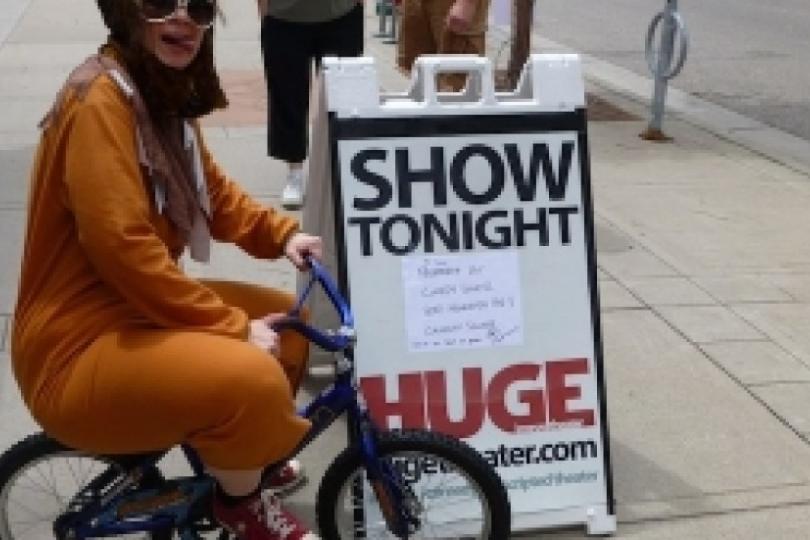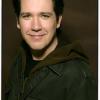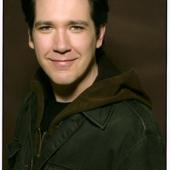Playlist profile: Jill Bernard
Interview

If you're a regular theater goer in the Twin Cities you may not know about the world traveler who crosses international borders as an ambassador of both the Twin Cities and the art of performance. That's because Jill Bernard is a five star luminary in the parallel world of improvised comedy that thrives here.
As her globetrotting schedule would suggest, Jill is all about building bridges between worlds. Before co-founding HUGE Theater, which opened its doors in 2010, Jill trained and performed at ComedySportz. She still performs regularly on that stage and in conversation promotes their upcoming anniversary with the enthusiasm of a natural booster and not a competitor for patrons. That sort of cooperative attitude may have something to do with the tradition of improv that she has been steeped in for years and years. Or it might just be Jill.
We began by talking about the difference between short form improvisation and long form and the relationship between the two.
In New York there’s a hostility or a schism between long form improvisers and short form improvisers. Do you find that’s true here or am I overstating the case?
No, there was an actual hostility in New York specifically. Matt Besser [of Upright Citizens Brigade] would kick around – this is what I’ve heard, I’ve never witnessed it – he would kick around a papier maiche mascot of ComedySportz in his class. That sounds like a fake story but it certainly captures the mood. Here it’s never been the case that there’s a schism. Sometimes you’ll meet a student that thinks there is one, but only because they don’t have a very broad window on improv. For example, they started taking classes at one theater, and they haven’t seen the other theaters, so they don’t know what else is out there, and they get a false impression.
The most amazing thing that happened when we opened HUGE—the thing I didn’t predict was that many of our performers came from ComedySportz. Especially in those initial shows, I thought it would be people who graduated from the Brave New Workshop and were homeless because they had graduated from that student program and had nothing to do, but more of our performers came from ComedySportz. I think in Minneapolis, because of the kind of training we have at ComedySportz, those performers are just really solid improvisers and flexible enough to do any style of improv.
Who are some of your favorite performers?
We were just talking about how much we love Tyler Michaels who just won an Ivey for Emerging Artist. He’s performed here as part of the Bearded Men for a long time. We just love him, there’s nothing he cannot do.
The most amazing thing happened at a show; he won the Minneapolis Improviser of the Year Award last year. It’s an award that’s randomly chosen. It happens by chance, by pure chance. And it just happened that he performed during the awards ceremony, and his performance was so strong that it felt like he legitimately won the award.
How does that work? That it’s randomly awarded?
Everyone’s name is in a hat and when you go up on stage to accept the award, you decline it, and you give a funny reason why you decline it. Then you read the name of the actual recipient. And whoever’s name is last in the hat is the Improviser of the Year.
Anyone else you’d like to mention?
We in the Cities are really lucky to have Noah Bremer from Live Action Set, among other things. I think he’s such a consummate performer, he’s so complete in what he can do. He can make you laugh so hard and then break your heart in the next moment. It’s gorgeous to watch him. He travels a lot so we don’t always get to have him in town, but he’s wonderful.
Then Lauren Anderson from the Brave New Workshop. I don’t know that she could ever get enough credit for what she brings to the Cities. She’s performed there [at BNW] in more shows than anyone in the history of the theater. She just grounds the place and continues to deliver incredible material and hilarious performances, revue after revue.
If you could describe your dream career, what would it look like?
I’m doin’ it! I’m livin’ the dream!
Somehow there’d be more money involved. For me. But when I picture… what I enjoy doing really is travelling to teach and perform. That’s really what I fell in love with the minute I was able to do it, the minute the first person hired me to leave the city. And having a home base here is the best of both worlds. Travelling a few weeks a month and then being here the rest of them time is really ideal for me.
What is your first memory of seeing a live performance?
My family went to an outdoor performance of Oklahoma. From my mom’s memory I was probably six or so. And I just remember thinking, I could do that! Making the decision right there, I’ll do that, that seems like a good job. Before that point I wanted to be a pony.
Was there a time when that desire to be a performer became more serious or was it the same from that moment on?
It was always with me. The only real course redirection is that when I was in college I was studying scripted theater. And when I was in college I auditioned for ComedySportz, and once I discovered improv I really never looked back, because it addressed all the problems I had with scripted theater: I have a terrible memory and I’m bad at taking direction. So for me scripted theater didn’t make a lot of sense. I also wearied by having to do the same piece over and over. As much as I love watching scripted theater, for me doing theater that’s more fresh and in the moment is more compelling. And that’s really the only alteration.
I get little harebrained schemes every year or so. Like I’ll sign up to get brochures on bookkeeping school. Or welding. Just little panic attacks but nothing serious.
Have you ever had a serious thought about stopping what you do?
One day I was teaching in Miami and no one had signed up for my workshop, and they had to cancel the workshop. And I was just standing on North Beach in the ocean up to my knees saying, “What am I doing?!” Just screaming, “What a waste of my life!” Then I finished freaking out and did a show that night and everything was fine.
Why do you act?
It feels in a lot of ways like what I was wired to do. I’m more comfortable in front of a hundred people than one person, so being onstage is a happier place for me. Which is the opposite of what most human beings feel. In addition, in my family and upbringing, humor was what we employed. So making people laugh from an early age was essential in terms of how I communicate, and when my brothers and I are alone that’s what we do.
Also, I think theater serves this essential function in human existence, comedy, maybe for me, more than any other: the ability to take people out of the everyday. Every day is such a grind. You get out of bed, you eat the same food, you spend time with the same people, you do the same job. What can we do to elevate this existence? What I’ve noticed, and I’ve only been performing for 20 years, but in that span of time I’ve noticed that people come to the theater more and more with dead eyes, a little bit zoned out. We have this essential function to remind them they’re alive. I really get a kick out reminding people of what it is to be human, to be alive.
Is there a show, process or performance you feel proudest of?
Improv is about tackling fear. And I think the most afraid I’ve ever been is two years ago. It was the first time I’d done my solo show Drum Machine in Spanish. And at the time I really didn’t speak Spanish well enough to do it. And I did it anyway. The first time I did it, in Argentina, it was rugged, it was murderous. I stumbled and I really didn’t even know a past tense at the time. So everything I said was implied to have just happened. There was no sense of distance or time. And the audience could not enjoy the show because they were worried for me.
Then I had the chance to perform again just this August in Peru. And not only had my language skills improved in that year and a half, I was more comfortable and looked more comfortable so I could joke with the audience that I wasn’t going to be able to do this very well. Everyone had a much better time; they got to laugh and laugh and laugh at this dumb American. It was so much fun.
Those two shows I’m really proud of because it is about doing things you’re afraid of doing and connecting with people.
How did you get the idea to do a show in Spanish in the first place?
A couple of years ago my mother and I were talking about bucket lists and I was tying to think of what was on my bucket list, and the only thing I could think of was learning Spanish. I had accomplished everything else I had intended to accomplish. If there’s just one thing on your bucket list, you should get on it. So I’ve been studying Spanish and I really feel like Minneapolis is a place with a lot of Spanish speakers, and there’s very little entertainment for them and zero improv. So I’d love to somehow connect with the Spanish speaking population of Minneapolis. And this is a couple of years out, because my language skills are not where they need to be to do that. But to bring that kind of entertainment to more people in Minneapolis would be great.
When you were in Peru and Argentina, did you teach?
I tried to teach in Argentina. Boy was that a mistake! It went so badly. The students weren’t improvisers, they were theater students. So they really didn’t know what I was talking about. My language barrier was so steep and the woman translating for me was great but she wasn’t an improviser so she didn’t know what I was talking about.
Are there other cultural barriers when you teach internationally, in other English speaking countries for instance?
Every country has their improv tradition, and then there’s a slice of it that’s linked to the cultural scene as a whole. For example, Mexican improv has a lot of storytelling aspects to it. The American tradition of improv is mostly from Viola Spolin and Del Close in Chicago. But the whole rest of the world follows Keith Johnstone, who’s from Canada. So the improv that you encounter in the whole rest of the world has this influence that Americans are not as typically familiar with.
But I’m lucky because ComedySportz is like one step removed from Theatersports, which is the Johnstone structure. So I’m a little bit bilingual in both kinds of improv, and I’m able to talk to people internationally. But at its essence, improv is improv and that makes me laugh every time. You stand in a room of improvisers anywhere in the world, and it’s like, these are my people.
Is there a show or performance that really knocked you out?
My Holy Grail of shows right now is, there’s this show from Columbia called Speechless. It’s two men and a Canadian DJ, she plays with them, and they speak almost no words, but they’re both also circus trained. I watch them improvise and it’s -- You watch someone who’s an incredible theater artist and you’re like, “Maybe I could do that if I tried hard enough,” but I watch them and think, “No, I’d have to go back in time and somehow train as a circus performer to get to do that.” They really blow me away. I’m trying to figure out how to file the paperwork to get them here to do the show, so people could see it.
How did you come across it?
I met them in Argentina. No. Germany.
How did you get started working in other cities and countries and how did it become such a large part of your work?
The international portion of my travels is new. I started nationally in about 2002. You go to an improv festival and after that you’re a Festival Performer, and you have this one bullet point on your resume. The same thing happens with teaching at improv festivals. Somehow you get your foot in the door once and you’re Improv Festival Teacher. Then you claw your way up bullet by bullet on your resume, and suddenly you have a reputation. What happens is you go places and the people who take your class there have travelled from elsewhere, so they go home and talk about you, and it feeds like that.
I also wrote a small book, and I honestly think that helps. Because there’ve been orders for it from all over the world, so, even though it’s brochure sized, it’s not as hard a sell because they’ve heard of me.
All I ever tell people is, You’ve just got to get your foot in once. Just find somebody who will let you perform at their festival and teach at their festival, then you’re a thing.
If you could change one thing about the way the profession works, what would it be?
In the early history of German theater it was all sponsored by the government. And you could make a good living as a theater artist. They would give you money to make art. I really think that’s the hardest part about improv in this country: you don’t get money or a stipend to do it. It’s hard because the venues would love to give more money to the performers, but the cost of tickets covers keeping the building open. I wish there was a way to have, like Shakespeare did, a sponsor or a patron, some elderly widow who wants to sponsor improv.
What keeps you going?
They sell this Vietnamese coffee at I Am Coffee…
No, in terms of myself professionally, I just love it.
In terms of being the Director of Education and the Board Secretary for HUGE Theater, I feel like it’s something our city needs. There are so many incredibly talented performers here, some of them don’t even know they’re incredibly talented, and I get up and do it for them.
Sometimes I work sitting at this desk [in the lobby of HUGE], and there’s a TV where you can see the shows inside, and I really like working in that spot. I’ll be doing something boring like looking up financial numbers or something, doing some accounting stuff, and I’ll look up and get to see the show. And I’ll make the connection in my brain, I’m doing this to make that happen.




